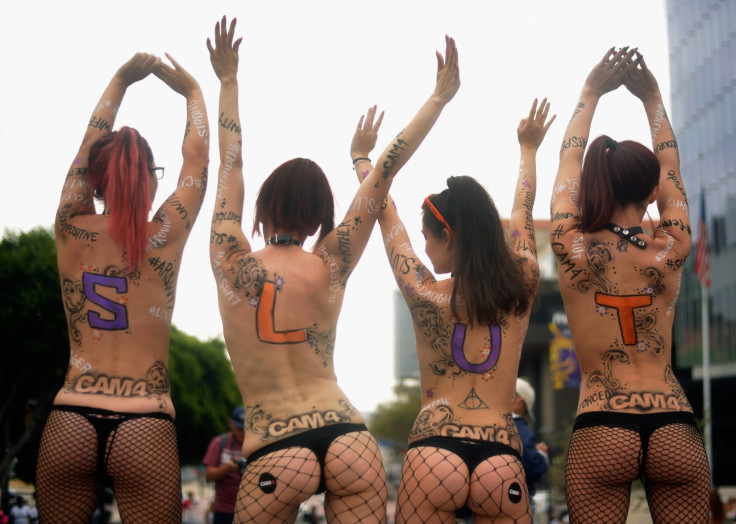Sorry sisters, but marching for consent with glittered nipples plays into the hands of sexists
We need to stop redefining feminism as shiny, sexy and fun.

SlutWalks, Free the Nipple, Naked Girls Reading. All of these events are marketed in the name of feminism. But be warned: these are the Che Guevara t-shirts of women's liberation.
We all know that liberation movements, when they are popular enough, get digested by moneymakers and spat back out in commercial form to serve whoever stands to benefit. Producers of everything from magazines to cosmetics, lingerie and music videos stand to gain from a feminism redefined as shiny, sexy and fun – it keeps women consuming what we'd otherwise shed.
While this is obvious to most people, we haven't got very good at discerning pop feminism from the real thing. Because of this, franchises like Naked Girls Reading – where women recite literature in the nude – rope in an audience. And "sex positive" has become many a self-identified feminist's personal brand. This is despite the fact that "sex-positive" feminism is doing the patriarchy's work for it", to quote feminist writer Glosswitch.
The latest in New Zealand is the "Glittery March for Consent". Over the new year, organiser Madeline Anello-Kitzmiller was at the annual Rhythm and Vines festival, where a man groped her and ran as she strolled through the festival grounds baring glittered breasts. Anello-Kitzmiller stopped, turned around, followed the guy, and slapped him while her friend splashed her drink in his face.
Now they are marching to raise awareness about consent – but their demands are much less of a slap in the face to perpetrators of sexual violence. Anello-Kitzmiller is calling attention to "consent", as if "Hello, may I grab your boobs?" would not have still been sexual harassment.
What about marching to reject female sexual subservience? Anello-Kitzmiller is from Oregon – she could take a leaf out of the Warrior Sisters' book, a women's collective based in the US state who run free self defence classes for women. We could demand those too, as well as an end to the violence that makes them necessary.
Instead, the "Glittery March for Consent" broadcasts that men are welcome, while women are told it is OK to get their gear off. The idea is to rebel against the victim-blaming that so often sees women accused of inviting assault because of what we wore or exposed of our bodies. "Who is brave enough to rock #glitterboobs"? asks GypsyFest, a business that will be present at the march "glittering as many humans as possible, just your face or your whole damn chest".
"Brave enough". Is that a dare? New Zealand media outlet The Spinoff has added to the pressure by referring to those of us not comfortable with others baring all for "freedom" in a porn-saturated country facing a sexual violence epidemic, as the "prudes of New Zealand".
March organisers claim that there is no pressure, no dress code. But that is a little disingenuous while women are being sold the notion that the "glitterboob" is a genuine challenge to sexual assault – and while this only piles onto existing pressure on us to flaunt ourselves or else be labelled a prude or bore. Calling this a personal choice is hardly convincing, either. Some choice! As feminist theorist Dr Meagan Tyler has pointed out, "choice arguments are fundamentally flawed because they assume a level of unmitigated freedom for women that simply doesn't exist".
Consider what can happen to a woman's life if so much as a picture of her is taken and put on the internet – she won't be able to "consent" to that or the aftermath.
The logic behind Free the Nipple-type events is that normalising public exposure of women's breasts will accustom men to the sight until they're no longer tempted into assault. One of the problems with this idea is that it rests on the same habituation principle as pornography does, and the trajectory does not lead incrementally toward liberation. Instead, as men are desensitised, the game is lifted. In pornography, that means more explicit degradation and violence. Men did not used to like watching a woman being penetrated until she suffers rectal prolapse, but they do now. It's called "rosebudding".
As long as power is still in men's hands, and men can still buy women by the hour, consume pornography, broadcast misogyny, and capitalise from it all – while controlling every position and institution of influence there is – the habituation principle doesn't work in women's favour. If women are not gathering to take power away, but we are taking more clothes off in more places, we are succumbing to the demands of men. If we are forcing or coercing other women to accept this status quo, we're doing the patriarchy's work for it.
Events like the Glittery March for Consent do not challenge men's feelings of entitlement to women's bodies. They show men that if they act like jocks, they get rewarded. What's more, they serve to domesticate feminism and keep it consistent with the sexualised norms women are supposed to conform to anyway.
In the words of journalist Sarah Ditum: "let's teach girls more than consent. Let's teach them refusal. Non-compliance. Let's raise a female generation that knows the giddy pleasure of laughing off heterosexual drudgery. And then the boys, if they don't want to be left behind completely, will have no choice but to learn to do better."
Chelsea Geddes is a student, artist and writer whose work has been translated into German, Spanish, French and Norwegian.
Renee Gerlich writes the feminist blog reneejg.net and recently curated the exhibition Too Much Truth: Women's Global Resistance to Sexploitation in Wellington, New Zealand.




















